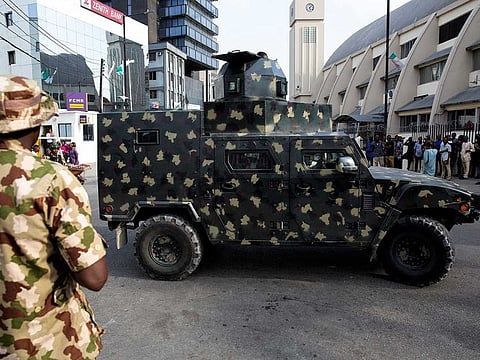Nigeria’s opposition calls for cancelling ‘sham’ election
Opposition parties say failures in system allowed for ballot manipulation

Lagos: Nigeria’s main opposition parties on Tuesday called for the country’s presidential election to be scrapped, alleging that results showing the ruling party’s candidate in the lead had been massively manipulated.
With President Muhammadu Buhari stepping down, many Nigerians hoped Saturday’s vote would open the way to a leader able to tackle insecurity, ease economic malaise and manage poverty in Africa’s most populous country.
Voting was mostly peaceful but was troubled by delays, and technical problems disrupted uploading of tallies from local polling stations to a central website meant to improve transparency.
Early results show ruling All Progressives Congress (APC) candidate Bola Tinubu, a former Lagos governor, leading main opposition Peoples Democratic Party (PDP) candidate Atiku Abubakar and a surprise third challenger, the Labour Party’s Peter Obi.
“The election is irretrievably compromised and we have totally lost faith in the entire process,” Labour Party chairman Julius Abure told reporters along with PDP representatives.
“We demand that this sham of an election should be immediately cancelled,” Abure said. “We also call for a fresh election to be carried out.”
He also called for the dismissal of Mahmood Yakubu, who chairs Nigeria’s election overseer, the Independent National Electoral Commission (INEC).
“Contrary to the insinuation by both parties, results emanating from the States point to a free, fair and credible process,” INEC said in response.
“It is only fair for aggrieved parties to allow the conclusion of the process and approach the courts with their evidences to pursue their cases.”
The panel was expected to restart announcing results at 1000 GMT Tuesday, but postponed this twice.
‘Not free’
The opposition parties say failures in the system allowed for ballot manipulation and disparities in the results from what was tallied at local polling stations.
Nigeria has a long history of vote rigging and ballot buying, although INEC had said new technology would help curtail malpractice for Saturday’s presidential election.
“This election is not free, and far from being fair and transparent,” Abure said.
“President Muhammadu Buhari, this is the time of a great test of your integrity. Use your office to save Nigerians from this electoral mismanagement.”
The ruling APC party dismissed the opposition claims as an effort to “truncate” democracy because PDP and Labour knew they were losing.
“We want to remind them that election is a process like pregnancy. Like a pregnancy that has reached full term, it cannot be aborted,” said Dele Alake, APC campaign media advisor.
“We call on INEC to speed up the announcement of the result to quickly defuse the current atmosphere of anxiety.”
Two-thirds rule
International observers, including from the European Union (EU), have noted major logistical problems, disenfranchised voters and a lack of transparency by INEC.
The winning candidate has to garner the most votes nationally and score at least 25 percent in two-thirds of the states - a measure reflecting a country split between a mostly Muslim north and widely Christian south, and with three main ethnic groups.
Partial official results for 14 out of Nigeria’s 36 states show Tinubu had won six states, Abubakar five and Obi three.
Tinubu led with more than four million votes, while Abubakar had three million and Obi 1.6 million, according to national INEC figures.
One surprise result was Obi’s victory in Lagos, the state with the largest number of registered voters and the bastion of APC’s Tinubu, who is known as the “Godfather of Lagos”.
“You win some, you lose some,” Tinubu said.
Glitches
For the 2023 election, INEC introduced biometric voter identification technology for the first time at national level and the IReV central database for results to improve transparency.
Votes were tallied by hand at local polling stations, with images of result sheets uploaded online to INEC’s IReV.
But long delays in voting getting underway and the slow pace of uploading state-by-state counting fuelled accusations of manipulation.
Some photographs of the result counts on the IReV system were blurry, smudged and illegible. By Tuesday 1100 GMT, IReV had only uploaded results from 85,861 polling stations or less than half the 176,800 nationwide.
Local observer group Yiaga said it conducted a parallel vote tabulation for the presidential election and would hold a press conference after official results were released.
“If the official results are manipulated at any point in the process we will be able to expose it,” it said.
In 2019, INEC was forced to delay the election by a week just hours before voting started. PDP’s Abubakar claimed fraud when Buhari beat him, but the supreme court later tossed out his claim.
Whoever replaces Buhari must quickly get to grips with Africa’s largest economy and top oil producer, which is beset by problems including a grinding jihadist war in the northeast and double-digit inflation.
Buhari, a former army general first elected in 2015, will step down after two terms in office. His critics say he failed in his key promises to make Nigeria safer.
Sign up for the Daily Briefing
Get the latest news and updates straight to your inbox



